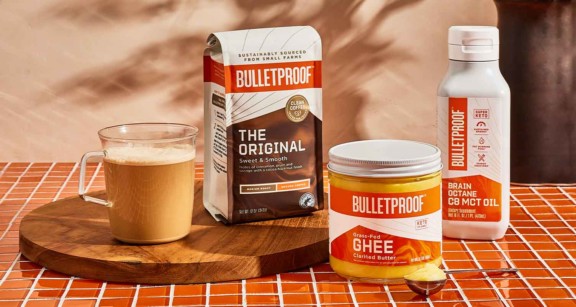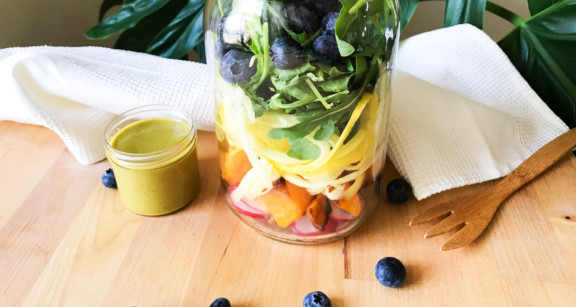Superfoods
You may have heard about superfoods, but what exactly are they? The truth is, there are no scientific markers that define what a superfood is. However, the term is loosely used to describe nutrient-dense foods with important health benefits.1 They are typically packed with vitamins, minerals, antioxidants and other beneficial compounds.
Examples of superfoods include berries (like blueberries and açai berries), leafy greens (such as kale and spinach), fatty fish (like salmon and sardines), nuts and seeds (such as almonds and chia seeds) and certain grains (like quinoa).
Incorporating superfoods into your diet can help you target specific health goals, like weight loss, improved digestion, enhanced immunity and increased energy. You can choose from a wide range of foods to add to your daily meal planning or try convenient superfood supplements.
Read on to learn about superfoods, their benefits, recent studies on superfoods, the Bulletproof approach to superfoods and delicious recipes you can try to boost your daily intake.
What are Superfoods?
Superfoods refer to highly nutritious foods which may offer various health benefits due to their nutrient-rich content. Incorporating superfoods into your diet can help you supercharge your body and mind by providing the fuel they need to tackle the day.
Next, discover a few ways that superfoods may positively support your health.
Benefits of Superfoods
Superfoods may support certain health-related concerns. Some important health benefits include:
Immune System Strength
Some superfoods, like holy basil2, ginger3 and turmeric4 can strengthen your body’s immune response. Try upping your superfood intake when you feel like you’re rundown or about to fall sick.
Gut Health Support
Consuming probiotics can help your gut have a diverse and healthy microbiome. This translates into improved digestion and absorption of nutrients.5 Get your probiotics from kombucha, kimchi, kefir, yogurt or supplements.
Weight Management
Eating nutrient-dense foods like almonds, salmon, eggs and chia seeds can help you feel fuller longer. You’ll be less likely to snack when you reach for high-protein snacks.
Joint Health
Several superfoods can potentially improve joint health due to their rich nutrient content and ability to support overall joint function. These include olive oil, sardines, flaxseeds6, kale, bone broth and avocados.7
The Science-Backed Benefits of Superfoods
Childhood Development
Spirulina may help children attain developmental milestones quicker, according to a recent study on 501 infants, ranging from 6 months to 18 months.8 Children who supplemented with spirulina for 16 months showed higher scores in gross and fine motor development, social skills and language than the control group. This algae superfood may provide antioxidants and inflammation support.9
Heart Health
Another featuring the superfood blueberries, claims that the berry could help prevent cardiovascular disease. Participants who consumed one cup of blueberries every day for six months showed marked improvements in endothelial function, cholesterol concentrations, and systemic arterial stiffness. Researchers recommend increasing the daily intake of blueberries for people wanting to improve their cardiovascular health. A research study featuring the superfood blueberries, claims that the berry could help reduce cardiovascular disease.10 Participants who consumed one cup of blueberries every day for six months showed marked improvements in endothelial function, cholesterol concentrations and systemic arterial stiffness. Researchers recommend increasing the daily intake of blueberries for people wanting to improve their cardiovascular health.
Mood
And finally, is chocolate good for you? Science says yes. Researchers found that consuming 85% cocoa dark chocolate can help improve your mood.11 That’s because dark chocolate has a prebiotic effect on intestinal bacteria, potentially improving negative emotional states through the gut-brain axis. That’s excellent news for all of us chocolate lovers.
The Bulletproof Approach to Superfoods
At Bulletproof, we create superfood products that not only deliver exceptional taste but also provide tangible, science-backed benefits. We want to help you get the most out of superfoods in a convenient and accessible way.
Our Ingredients
Getting your daily dose of superfoods is not always easy when you’re having a busy day. Supplementing with superfood-rich products can help you achieve your health goals no matter what.
Our greens powder not only provides an excellent variety of superfoods, but it also has minerals, vitamins, nootropics and digestive aids. A single scoop provides a full serving of fruits and vegetables that include spinach, kale, broccoli, celery, cauliflower, cabbage, kelp, cucumber, limes, lemons, blueberries and strawberries. That’s a lot of body and mind-fueling goodness! Greens are a quick and convenient way to get more essential nutrients into your daily routine. They provide all the benefits without fuss.
We consider all of our ingredients carefully when sourcing and formulating our products. How seriously? Read all about our supplement testing standards next.
Our Supplement Testing Standards
We hold our ingredients to the highest testing standards to bring you top-quality products you can count on. Our science-backed approach to creating our products means we don’t leave anything to guesswork. The Bulletproof team looks at the latest published peer-reviewed journals to choose ingredients and dosages for our supplements. Plus, our supplements go through four steps of extensive testing by unbiased, third-party labs.
First, the team looks at the ingredients in the supplement to make sure they are present and not diluted. Then, they test for purity to ensure there are no harmful contaminants in the product. After that, researchers examine the amount of active ingredients in the supplement to make sure it matches what is stated on the label. And finally, the last step is composition testing to ensure the supplement meets all label specifications.
Our supplements are aligned with FDA regulations, and they adhere to standards for composition, strength, purity and identity. We believe in providing you with evidence-based ingredients that do what they say they do.
Superfoods Recipes
Getting more superfoods in your diet means including nutrient-dense foods in your meal prep. Take a look at some of our favorite recipes that are delicious and nutritious.
Learn More About Superfoods
Superfood Articles
Superfoods That Help Fight Inflammation and Taste Amazing
Moringa Benefits: Why You Need This Superfood Supplement
5 Good Foods for Skin Health and Radiance
6 Benefits of Cherries, a Bite-Sized Superfood
Coconut Vinegar: Legit Superfood, or Health Hype? Here’s What You Need to Know
Is Chocolate Good For You? The Health Benefits of Chocolate
Rooibos Tea Benefits Weight Management, Plus 9 Other Reasons to Drink It
What Are The Benefits Of Green Tea?
It’s Always Golden Hour With These 7 Turmeric Benefits
Himalayan Salt Benefits: Why It’s Better Than Table Salt
What Are Greens? 6 Things to Look for in a Greens Powder Supplement
Is Chocolate Healthy? 8 Surprising Answers to Questions About Chocolate
Celery Juice for Digestion and Bloat: Why Your Gut Loves This Green Juice
Ashwagandha Benefits: Stress Less and Handle More
Just 1-2 Daily Servings of Leafy Greens Slows Cognitive Decline, Study Finds
Sweet Potato Nutrition Info and Health Benefits
Panax Ginseng: Uses, Benefits and More About This All-Star Adaptogen
FAQs
Yes. Adaptogens are a class of natural substances, including certain herbs and mushrooms, that may help the body adapt to stress and maintain balanced state.12 They have been used in traditional medicine systems, such as Ayurveda and Traditional Chinese Medicine, for centuries. Adaptogens are known for their ability to help the body respond to stressors, whether they are physical, emotional or environmental. They work by regulating the body’s stress response system, which includes the hypothalamus-pituitary-adrenal (HPA) axis.13 Examples of adaptogens include ashwagandha, rhodiola rosea, ginseng, holy basil (tulsi) and cordyceps mushrooms.
Yes. Antioxidants are essential molecules that play a critical role in safeguarding the body against oxidative stress.14 Oxidative stress occurs when there is an imbalance between free radicals, highly reactive molecules with unpaired electrons and antioxidants in the body. These free radicals can cause cellular damage, impacting proteins, DNA and other vital components, leading to various health issues and contributing to the aging process. Antioxidants act as defenders by neutralizing free radicals. They do this by donating electrons to stabilize the radicals, preventing them from causing harm to cells and mitigating potential damage. Examples of antioxidant-rich foods include berries, citrus fruits, leafy greens and dark chocolate.
Yes. Phytonutrients or phytochemicals are naturally occurring compounds found in plants that contribute to their vibrant colors, flavors and protective mechanisms. They exhibit antioxidant properties,15 meaning they can neutralize harmful free radicals in the body, reducing oxidative stress and inflammation. Plus, they with a range of health advantages, including supporting cardiovascular health, supporting the immune system, reducing the risk of chronic diseases and enhancing overall well-being.16
Superfoods can contribute to better gut health by supporting a healthy balance of gut bacteria and promoting better digestion. Ginger has anti-inflammatory properties that may alleviate digestive discomfort and promote gut health.17 Another gut-friendly superfood is curcumin, the active compound in turmeric. It may support certain health-related concerns and has antioxidant properties.18 19 Other superfoods that may help with digestion include miso, kimchi, kefir, tempeh and bananas.
Many superfoods may help support your immune system by providing essential nutrients and immune-boosting compounds. Citrus fruits, such as oranges, grapefruits, lemons and limes, are rich in vitamin C, a key nutrient that stimulates the production of white blood cells, crucial for immune function.20 Garlic contains allicin, a compound renowned for its antimicrobial properties, potentially aiding the immune system in combatting infections.21 Other superfoods you may want to try include almonds, bone broth, kombucha and salmon.
Although you can get many superfoods from diet alone, taking supplements can help you consistently get your daily dose (especially for those days when you’re short on time). One significant benefit of taking superfood supplements is the convenience they offer. Supplements provide an easily accessible and time-efficient solution, helping you to access essential nutrients without the need for extensive meal planning or preparation. Also, supplements assure you year-round availability. Certain superfoods are seasonal, which means they may not be readily accessible at all times. Supplements bridge this gap, ensuring that you can reap the benefits of these superfoods consistently, regardless of the season.
Start by considering your individual health goals, dietary preferences and nutritional needs. Whether you’re aiming to boost your immune system, improve digestion, enhance cognitive function or manage your weight, understanding your goals will guide your superfood selection. Take stock of what you typically eat to identify any nutritional gaps. If you’re lacking in certain vitamins, minerals or antioxidants, look for superfoods that can fill those gaps. For example, if you rarely consume fish, you might consider omega-3-rich superfoods like chia seeds or flaxseeds or taking fish-oil supplements. If you’re unsure which superfoods are best for you, consult a healthcare provider. They can assess your specific needs and recommend a personalized superfood plan.





